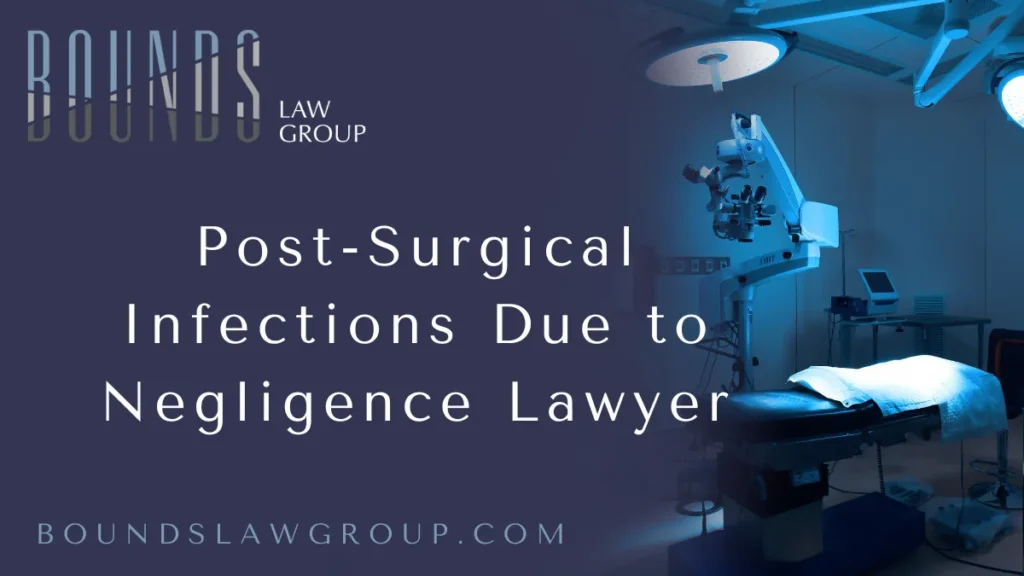
Florida Post-Surgical Infections Due to Negligence Lawyer | Bounds Law Group
Post-surgical infections can have devastating consequences, especially when they occur due to medical negligence. If you or a loved one has suffered from a post-surgical infection because of a healthcare provider’s carelessness, you may be entitled to compensation. At Bounds Law Group, a post-surgical infections due to negligence lawyer specializes in representing victims of medical malpractice, ensuring they receive the justice they deserve.
Complete our free case evaluation form or call us now at 877-644-5122 to discuss your legal options.
Post-Surgical Infections Due to Negligence
Surgical procedures inherently carry some risks, but post-surgical infections due to negligence are entirely preventable. These infections typically occur when medical professionals fail to follow proper sterilization techniques, neglect to monitor patients for signs of infection, or make errors during surgery that introduce harmful bacteria into the body.
Common causes of post-surgical infections due to negligence include:
- Unsanitary Surgical Instruments – Failure to properly sterilize instruments can introduce dangerous pathogens into the surgical site.
- Improper Wound Care – Post-operative wounds require strict hygiene and care to prevent infections.
- Failure to Administer Antibiotics – Doctors may neglect to prescribe or administer necessary antibiotics to prevent bacterial infections.
- Hospital-Acquired Infections (HAIs) – Many hospitals struggle with bacterial contamination due to poor infection control measures.
- Delayed Diagnosis and Treatment – When healthcare providers fail to recognize or treat an infection early, it can lead to severe complications, including sepsis.
Signs and Symptoms of a Post-Surgical Infection
If you have undergone a surgical procedure and are experiencing any of the following symptoms, you may have developed an infection due to medical negligence:
- Redness, Swelling, or Warmth Around the Surgical Site
- Persistent Pain or Tenderness
- Foul-Smelling Discharge or Pus
- Fever, Chills, or Night Sweats
- Nausea and Vomiting
- Delayed Healing of the Surgical Wound
Prompt medical attention is crucial to prevent the infection from worsening. If a doctor or hospital failed to diagnose and treat your infection in a timely manner, you could have grounds for a medical malpractice lawsuit.

Why You Need a Post-Surgical Infections Due to Negligence Lawyer
Navigating a medical malpractice case is complex, and having a dedicated post-surgical infections due to negligence lawyer is essential. At Bounds Law Group, we have extensive experience handling cases involving medical negligence, and we fight aggressively to secure maximum compensation for our clients.
How We Can Help You
- Conducting a Thorough Investigation – We gather medical records, consult with experts, and analyze evidence to build a strong case.
- Proving Medical Negligence – Establishing that your infection was caused by substandard medical care is key to winning your case.
- Negotiating with Insurance Companies – We handle all communications and negotiations with insurance companies to ensure you receive a fair settlement.
- Taking Your Case to Court – If necessary, we are prepared to go to trial to fight for your rights.
Compensation for Post-Surgical Infections Due to Negligence
Victims of post-surgical infections due to negligence may be entitled to various types of compensation, including:
- Medical Expenses – Covering the cost of additional treatments, hospital stays, and medications required to treat the infection.
- Lost Wages – Reimbursement for income lost due to extended recovery time or disability.
- Pain and Suffering – Compensation for physical pain, emotional distress, and diminished quality of life.
- Punitive Damages – In cases of gross negligence, courts may award additional damages to punish the responsible parties.
Proving Negligence in a Medical Malpractice Case
To win a post-surgical infections due to negligence case, we must prove:
- Duty of Care – The medical provider had a duty to follow standard procedures to prevent infections.
- Breach of Duty – The provider failed to uphold proper medical standards.
- Causation – The provider’s negligence directly caused the infection.
- Damages – The patient suffered harm as a result of the infection.
Statute of Limitations for Medical Malpractice Cases
It is crucial to act quickly if you suspect medical negligence. The statute of limitations varies by state, but in many cases, you have only a limited time to file a lawsuit. Delaying action could mean losing your right to seek compensation. Contact Bounds Law Group today to discuss your case.

Preventing Post-Surgical Infections: Steps Medical Professionals Must Take
Preventing post-surgical infections due to negligence requires strict adherence to infection control protocols. Medical professionals must take the following preventive steps:
- Proper Hand Hygiene – Doctors, nurses, and all medical staff should follow strict handwashing protocols before and after surgery.
- Sterile Surgical Environment – Operating rooms must be kept clean and free from potential contaminants.
- Use of Antimicrobial Sutures – Some surgeries benefit from antimicrobial-coated sutures to reduce infection risks.
- Post-Operative Monitoring – Close observation of patients post-surgery ensures early detection of any signs of infection.
- Patient Education – Patients should be provided with clear post-operative care instructions to minimize infection risks at home.
When healthcare providers fail to implement these necessary precautions, post-surgical infections due to negligence can occur, leading to unnecessary pain, prolonged recovery, and even life-threatening complications.
Contact Bounds Law Group Today
If you or a loved one has suffered from a post-surgical infection due to negligence, you need experienced legal representation. Bounds Law Group is here to help you fight for justice and secure the compensation you deserve.
Complete our free case evaluation form or call us now at 877-644-5122 to speak with a dedicated medical malpractice attorney.
Sources:
- Centers for Disease Control and Prevention (CDC) – Information on surgical site infections and prevention strategies. https://www.cdc.gov/hai/ssi/ssi.html
- National Institutes of Health (NIH) – Research on hospital-acquired infections and their impact on patient health. https://www.ncbi.nlm.nih.gov/pmc/articles/PMC5851682/
- American Medical Association (AMA) – Guidelines for surgical safety and infection control. https://www.ama-assn.org/

